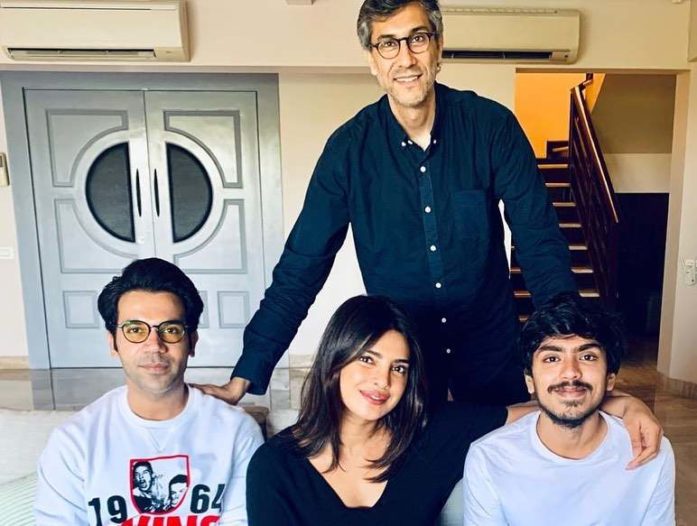When I first read The White Tiger a few years back, I readily gave it five stars on Goodreads, but the real impact was diluted with other happenings around. Now, this 2008 Man Booker Prize-winning novel has been adapted to a pretty accurate movie. I have also wondered which of these two to review here, the novel, or the movie. I certainly prefer the novel, but the movie is suited for its proper category. Believe me, I have re-read the book right after watching the movie and I was profoundly impressed. I have also totally changed my feelings toward Rajkumar Rao, certainly considering his performance in Ludo (2020) as well.

The White Tiger group caption: Rajkumar Rao, Priyanka Chopra, Adarsh Gourav, and director Ramin Bahrani
[source: imdb.com]
The White Tiger – Plot
It was a big thing to adapt this novella to a movie because it’s a bitter critic of Indian society and politics. India is a rich country with 99% poor people. One may show this but usually doesn’t comment. India is a country that stimulates entrepreneurship if you know your ways there. It is not an easy road, but you have to leave your conditioning. There is a metaphor here, about Darkness and Light, it explains the mechanism of your destiny. The denying of the caste system just complicates things. One of my former Indian Social Media connections, a guy whose opinion I respect tremendously, said once that even if it looks bad from the outside, the designated caste system helped to keep things orderly, like a machine with all its pieces greased in its place. When “equality” was introduced after Partition, all the trouble began. In the movie, there is a Great Socialist character, a hint to Indira Ghandi, I guess. In Raid (2018), another movie dealing more explicitly with corruption and avoiding tax paying, the hint toward the Premier, a woman was obvious. In the book, the Great Socialist is a man, someone who was in politics since Balram Hallway, “Munna” (Boy), was a kid in a village elementary school, in the eighties. Munna was the only one in his class who knew to read, and he was nicknamed the White Tiger by an Education Inspector.
Now, the family, kept on strings with iron hands by his ignorant Granny, Kusum, wanted him to work, not to become some learned fellow. Their village was racketed by a family of landowners with funny animal nicknames.
Balram Hallway, the White Tiger, manages with his wit and cunning to become the landowner’s family driver, and later, to drive one of the sons and his wife in New Delhi. I don’t go further, you have to watch the movie yourself, or even better, read the book first, and then watch the movie.
Cast
Adarsh Gourav is Balram Halwai, the White Tiger. Rajkummar Rao is Ashok, Balram’s employer, the Stork’s son. Priyanka Chopra is Pinky Madam, Ashok’s Indian American wife. Kamlesh Gill is Granny Kusum. Satish Kumar is Balram’s father, a rickshaw puller. Mahesh Pillai is the School Inspector. Mahesh Manjrekar is ‘The Stork’. Vijay Maurya is Mukesh ‘The Mongoose’, the Stork’s other son, a nasty fellow, like his father.
Written by Ramin Bahrani and Aravind Adiga, the book author. Directed by Ramin Bahrami.
Trailer-Teaser
I like this trailer, it’s deceiving. The action is pretty simple.
In The End
Very good acted, this is a rare critic, therefore, it was hard to believe that the Indians will agree with its dispersal. First, the book’s unflattering portrait of India as a society racked by corruption and servitude has caused a storm in Aravind Adiga’s homeland. There were still some problems about distribution, caused by Netflix, but let’s see what happens. Do you know the reason, my friend, of why I haven’t created a Turkish cinema category here? Because with rare exceptions, vaguely hidden in Nuri Bilge Ceylan‘s movies, there is no real critic. Turks are the best, they are more special than others, their problems are different, their army is Galactic, and so on. Now again, with exceptions like here, in The White Tiger, the mainstream Indian cinema is very close to the Turkish vision. The Indians are special everywhere, their middle-class is rich, they are all businessmen, they are the smartest in the world and they always land on their feet, no matter what. Fortunately, there are some Indian gems I love, and I hope to not forget to review them here. I also hope to not bore you with too much foreign cinema, Korean, Indian, or the likes.
I’m afraid The White Tiger has lost its eligibility for the Oscars, but maybe they will change those rules.
[This is another post written months ago. Sorry for the delay, but I think its relevance won’t fade.]
If you liked what you read (and for that I humbly thank you for your patience), subscribe to this blog by Email! Follow this blog on Twitter, and on Facebook! For a joyous day, check out my pins on Pinterest or my grams on Instagram 😄. I hope you like this blog so much that you think it’s time to take a step further by becoming yourself a blogger; in order to do that have the kindness to read the Own Your Website offer I have prepared for you! You won’t regret. Thanks for passing by 😄 Speak your mind, don’t be shy!
